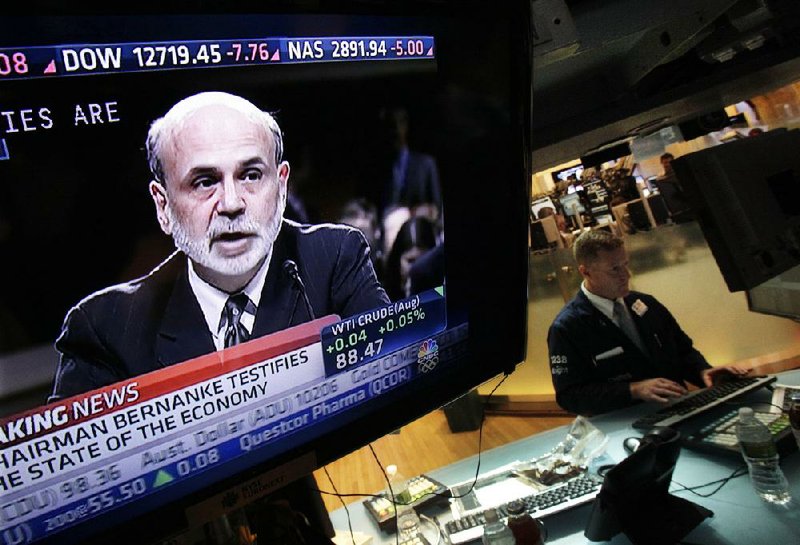WASHINGTON — The Federal Reserve is seeking greater clarity about the health of the economic recovery as it weighs the need for a new stimulus program, Federal Reserve Chairman Ben Bernanke said Tuesday.
In testimony before the Senate Banking Committee, Bernanke also defended the Fed’s actions after it learned of problems in 2008 with the London interbank offered rate, or Libor. And he renewed his warnings that congressional inaction on fiscal policy threatens to upend the recovery and tip the economy into recession.
Repeating a formula he first articulated earlier this summer, Bernanke told the committee that the Fed’s decision about additional economic stimulus would turn on its judgment about the likely pace of job growth in coming months.
The crucial issue, he said, is “whether or not there is in fact a sustained recovery going on in the labor market or are we stuck in the mud.”
Bernanke also added a new wrinkle, saying the central bank “would certainly want to react against any increase in deflation risk.”
With the rate of unemployment stalled above 8 percent, and some measures of inflation expectations falling, Bernanke’s remarks were read by some analysts as pointing toward probable action in the coming months.
But Bernanke avoided commitments, saying that Fed officials were continuing to review the data and to consider their options. He also noted that the Fed could take steps other than asset purchases, like extending its prediction that it will keep short-term rates near zero until late 2014.
“We are looking for ways to address the weakness in the economy should more actually be needed,” Bernanke told the committee.
Bernanke’s testimony underscored the Fed’s reluctance to ride once again to the aid of a plodding economy. The central bank has intervened repeatedly when the economy appeared at risk of sliding back into recession, and Bernanke’s testimony Tuesday included his standard promise to maintain that vigilance.
The members of the committee preferred to question Bernanke about revelations that banks had manipulated Libor, a benchmark rate used in determining the value of a wide range of financial assets.
As Pat Toomey, R-Pa., said to Bernanke, “I just wanted to touch briefly on monetary policy before moving on to the Libor scandal.”
In response to questions from members of both parties, Bernanke said the Fed has responded properly when it learned of problems with Libor by notifying British regulators, who oversee the index, and by offering suggestions for improvements.
Bernanke said he still lacked “full confidence” in the integrity and accuracy of the index because those suggestions had not been implemented. And he spoke with approval of efforts to supplant Libor with benchmarks based on an “observable market rate.”
Senators pressed Bernanke repeatedly about why the Fed did not raise a public alarm about the problems in 2008.
“Isn’t there a responsibility to alert the customers?” asked Jeff Merkley, D-Ore. “If you had it to do over again would you also be alerting the customers?”
Bernanke said the problem was widely reported at the time. In response to a similar question, he also said, “The responsibility of the New York Fed was to make sure that the appropriate authorities had the information, which they did.”
Bernanke also renewed his frequent warnings that current fiscal policy is endangering economic growth. He said planned cuts in federal spending at the end of the year could push the economy back into recession, while the projected long-term growth of spending is an “unsustainable path.”
“The most effective way that Congress could help to support the economy right now,” Bernanke said in his prepared testimony, “would be to work to address the nation’s fiscal challenges in a way that takes into account both the need for long-run sustainability and the fragility of the recovery.”
He also noted that a European crisis could undermine domestic growth.
Republicans pressed Bernanke to forswear action, warning that new measures would eventually lead to higher inflation and suggesting that the Fed’s policies are allowing Congress to delay a reckoning with the federal debt.
Bernanke, who is scheduled to testify today before the House Financial Services Committee, as part of his twice-a-year report to Congress on the state of monetary policy, rejected both arguments. Of standing still to put pressure on Congress, Bernanke said dryly, “I don’t think that’s my responsibility.”
He also noted that inflation remains under control, around the 2 percent pace that the Fed considers healthy.
Democrats, continuing a recent pattern, were less forceful in their calls for additional action by the Fed. They received from Bernanke only the assurance that the Fed took the issue of unemployment seriously.
The Fed announced a modest expansion in its efforts to stimulate growth after the most recent meeting of its policymaking committee in June.
It said it would continue to purchase long-term Treasury securities until the end of the year to reduce borrowing costs for businesses and consumers.
But analysts regarded that decision as a placeholder, a way of maintaining the status quo while the Fed waits to see whether it must do more. The Fed’s policy making committee is scheduled to meet July 31 and Aug. 1.
Business, Pages 25 on 07/18/2012
